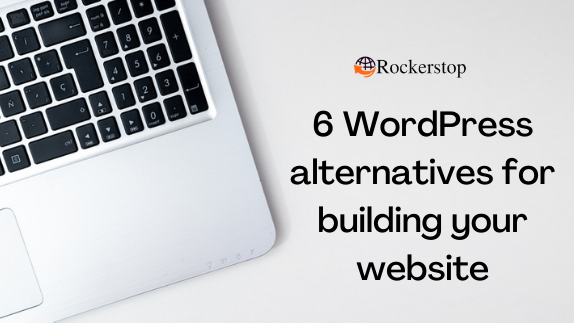WordPress alternatives
WordPress powers an astonishing 39.6% of internet sites in 2021, up nearly 5% from 2020, which begs the question… what WordPress alternatives are powering the opposite 60.4%??
WordPress could also be the foremost popular CMS (content management system), but that doesn’t mean it’s right for everybody. WordPress caters to a selected combination of DIY customization and convenience, but if you personally fall outside that audience—say you would like less customization and more convenience—then you’ll probably be more interested in the alternatives to WordPress.
We discuss the 6 best alternatives to WordPress.
1. Wix
Wix is one among the foremost popular alternatives to WordPress, and maybe its fiercest competitor. As with WordPress, Wix gives people with no professional design experience a user-friendly platform to create the sites they need, no prior experience necessary. However, Wix features a few perks that WordPress doesn’t, like free web hosting—paying for web hosting is one among the best drawbacks to WordPress.
But these perks come at their own cost. Although you’ll do tons with Wix customization, it still falls short in comparison with WordPress. Just check out their app stores, where WordPress offers 58,627 plug-ins, compared to Wix’s 250+ apps. It’s also worth noting that Wix pricing isn’t always what it looks, so sometimes the free plans aren’t exactly free.
2. Weebly
Weebly (ecommerce by Square) follows an equivalent business model as Wix and Squarespace, but more attuned for cheaper and easier solutions. That’s good for time and money, but means it’s limited in customization and features.
Compared to WordPress, Weebly is a breeze. It makes building a site easier, but you’ll need to sacrifice a number of the looks, features, and functionality you wanted. But if you’re willing to trade customization for convenience, Weebly may be a good selection.
3. Drupal
So far, our alternatives to WordPress are that middle tier of site-builders: a mixture of convenience and customization. But what if you would like a real WordPress alternative, an open-source CMS with more personalization from more effort.
Drupal comes in second behind WordPress because of the popular choice of CMS. At times it can get a touch technical, so there’s a clear learning curve, to not mention there’s no drag-and-drop WYSIWYG editor, like Wix and Weebly. But that’s just the worth for flexibility—Drupal offers features and options for virtually any industry. Plus, it allows you to mix-and-match elements to make a singular blend, a bit like WordPress.
4. Joomla
If you want the complexity and community aspects of WordPress, Joomla could be the simplest WordPress alternative for you. Joomla is another open-source CMS, and may give WordPress a run for its money even within the blogging category.
Joomla features a lot of built-in features that are ready right out of the box, including SEO and multilingual functionality, which is out there on WordPress only through a paid plug-in. Even though it hosts a widespread community, the WordPress community remains larger, meaning WordPress has more add-ons and features for variety.
5. Jimdo
We’ve checked out the WordPress alternatives for both robust solutions and DIY customization. But what if you’re trying to find alternatives to WordPress that are quick and painless? Jimdo allows you to build basic and straightforward sites in no time with no hassle, but don’t expect anything too advanced.
Jimdo is for once you don’t want to bother with web design—you can even let Jimdo’s AI build a site for you during a few seconds, supported answers to a questionnaire. If you would like that sort of convenience, though, you’ve got to sacrifice individuality and personalization.
6. Squarespace
Squarespace is the other main opponent of WordPress alternatives, after Wix. This platform is similar to Wix, with a user-friendly interface designed for learners. That means if Wix was more appealing to you than WordPress, likely Squarespace are going to be, too.
The difference between Squarespace and Wix is subtle. Wix may be a little more user-friendly and Squarespace may be a little more advanced in customization. Despite that, Squarespace still offers less features and adaptability than WordPress, so if you’re trying to find more options, WordPress remains your most suitable option. On the other hand, Squarespace offers many beautiful, modern templates, so you’ll get an honest looking website more quickly and simply than with WordPress.
And if you’re trying to find something completely custom, you’ll even hire a Expert to style your website for you.
Picking the proper CMS or site builder for your needs is a crucial step, so don’t rush it. But none of those WordPress alternatives—or even WordPress itself—can prevent from bad design. No matter what platform or CMS you employ, you continue to confirm your website has all the proper visuals, layout and functionality for your business.
Read More – The Principles of Website Usability
